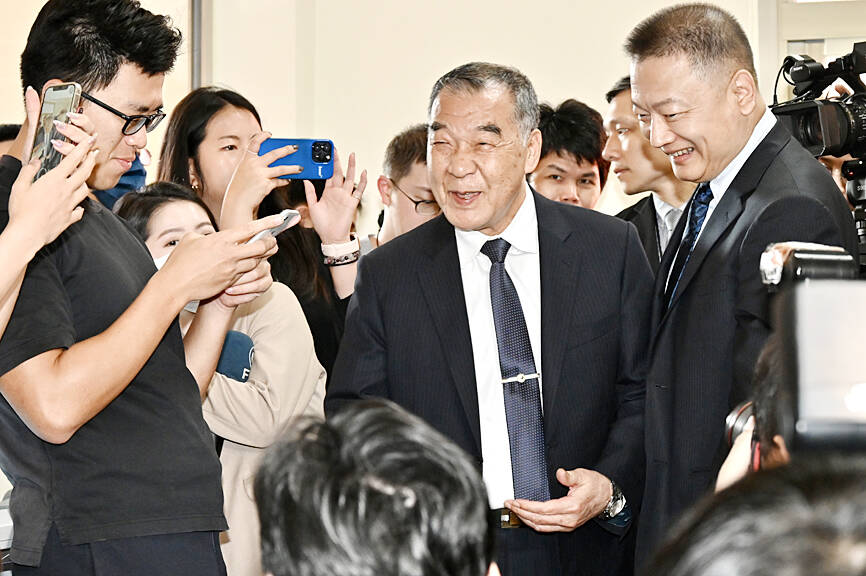Taiwan’s Indigenous Submarine Program would remain on track, Minister of National Defense Chiu Kuo-cheng (邱國正) said yesterday, after the head of the program resigned due to what he said were unfair attacks against him and the military.
Taiwan has made the submarine program a key part of an ambitious project to modernize its armed forces as Beijing stages almost daily military exercises.
Taiwan unveiled the first of eight new submarines in September last year, although it is not expected to enter service until next year.

Photo: George Tsorng, Taipei Times
In a statement late on Tuesday, Admiral Huang Shu-kuang (黃曙光) said that he had resigned as head of the submarine project, as he and the program had been subjected to unfair attacks from people he did not name.
Huang told Reuters that the submarine task force, which includes the navy and shipbuilder CSBC Corp, would continue to operate despite his departure.
“It’s impossible that the team will be disbanded due to one man’s departure,” he said.
Chiu said that Huang is a “conscientious” person, but “members of the task force are all on active duty and can work for a long time. It will not change due to a single personnel change.”
Huang had previously described the submarines as a “strategic deterrent” that could help maintain Taiwan’s “lifeline” to the Pacific by keeping ports along the east coast open.
Taiwan hopes to deploy at least two domestic submarines by 2027, and possibly equip later models with anti-ship missiles.
Chiu yesterday also defended the submarine program and said claims by local media that the costs would soar were “unfair.”
The navy has estimated the cost of constructing the seven vessels over 15 years to be more than NT$280 billion (US$8.62 billion), or about NT$40 billion per vessel.
That is higher than the prototype Hai Kun, which cost about NT$31.2 billion, local media reported.
When asked about the issue by Democratic Progressive Party Legislator Michelle Lin (林楚茵) at a meeting of the legislature’s Foreign Affairs and National Defense Committee yesterday, Chiu said the estimate not only included construction costs, but also expenses related to classified items.
Chinese Nationalist Party (KMT) Legislator Huang Jen (黃仁) also questioned why the cost was expected to rise, quoting Su Tzu-yun (蘇紫雲), a research fellow at the Institute for National Defense and Security Research, who previously said the cost of constructing each of the seven vessels was expected to fall to about 80 percent of the price of building the prototype.
Chiu said that the ministry plans to add “certain equipment” to the subs built after the prototype as it was felt the first vessel was “not necessarily sufficiently equipped.”
Furthermore, NT$280 billion was just an estimate as the budget proposal had not yet been submitted, he said, adding that taking that number and simply dividing it by seven was an “unfair” method of calculating the costs.
Additional reporting by CNA

Taiwanese can file complaints with the Tourism Administration to report travel agencies if their activities caused termination of a person’s citizenship, Mainland Affairs Council Minister Chiu Chui-cheng (邱垂正) said yesterday, after a podcaster highlighted a case in which a person’s citizenship was canceled for receiving a single-use Chinese passport to enter Russia. The council is aware of incidents in which people who signed up through Chinese travel agencies for tours of Russia were told they could obtain Russian visas and fast-track border clearance, Chiu told reporters on the sidelines of an event in Taipei. However, the travel agencies actually applied

Japanese footwear brand Onitsuka Tiger today issued a public apology and said it has suspended an employee amid allegations that the staff member discriminated against a Vietnamese customer at its Taipei 101 store. Posting on the social media platform Threads yesterday, a user said that an employee at the store said that “those shoes are very expensive” when her friend, who is a migrant worker from Vietnam, asked for assistance. The employee then ignored her until she asked again, to which she replied: "We don't have a size 37." The post had amassed nearly 26,000 likes and 916 comments as of this

New measures aimed at making Taiwan more attractive to foreign professionals came into effect this month, the National Development Council said yesterday. Among the changes, international students at Taiwanese universities would be able to work in Taiwan without a work permit in the two years after they graduate, explainer materials provided by the council said. In addition, foreign nationals who graduated from one of the world’s top 200 universities within the past five years can also apply for a two-year open work permit. Previously, those graduates would have needed to apply for a work permit using point-based criteria or have a Taiwanese company

The Shilin District Prosecutors’ Office yesterday indicted two Taiwanese and issued a wanted notice for Pete Liu (劉作虎), founder of Shenzhen-based smartphone manufacturer OnePlus Technology Co (萬普拉斯科技), for allegedly contravening the Act Governing Relations Between the People of the Taiwan Area and the Mainland Area (臺灣地區與大陸地區人民關係條例) by poaching 70 engineers in Taiwan. Liu allegedly traveled to Taiwan at the end of 2014 and met with a Taiwanese man surnamed Lin (林) to discuss establishing a mobile software research and development (R&D) team in Taiwan, prosecutors said. Without approval from the government, Lin, following Liu’s instructions, recruited more than 70 software